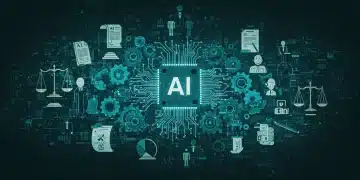Responsible AI development policies: shaping our future

Responsible AI development policies ensure ethical use of artificial intelligence by promoting accountability, transparency, and fairness, ultimately guiding the creation and implementation of AI technologies that benefit society.
Responsible AI development policies are gaining traction as technology evolves. Have you ever considered how these policies influence our interaction with AI? In this article, we’ll delve into their significance and potential impact.
Understanding responsible AI development
Understanding responsible AI development is essential in today’s tech-driven world. As artificial intelligence rapidly evolves, so do the standards and practices that ensure its ethical use. This approach helps balance innovation with safety and accountability.
What is responsible AI development?
Responsible AI development refers to creating AI systems that prioritize ethical considerations, transparency, and user safety. It ensures that AI technologies benefit society while minimizing harm.
Key principles of responsible AI
Several core principles guide responsible AI development:
- Accountability: Developers must take responsibility for their AI systems.
- Fairness: AI should avoid biases that can harm individuals or groups.
- Transparency: Users should understand how AI systems make decisions.
- Privacy: Respecting user data and ensuring security is critical.
These principles work together to create a foundation for trust in AI technologies. When each of these components is adhered to, AI can thrive in a way that promotes societal well-being.
Stakeholders, including developers, businesses, and policymakers, play a role in fostering responsible AI practices. Collaborative efforts are necessary to establish guidelines and regulations that align with these principles. For instance, creating cross-industry standards can help mitigate risks associated with AI deployment.
Another important aspect is education. By educating both developers and end-users, we foster an understanding of how to use AI responsibly. This knowledge empowers users to make informed decisions while utilizing AI tools.
In conclusion, embracing responsible AI development principles is vital as we move forward. The balance between innovation and ethics will determine how AI impacts future generations.
Key components of effective AI policies
Key components of effective AI policies are essential for promoting a responsible and ethical approach to artificial intelligence. Understanding these components helps stakeholders create guidelines that maximize benefits while minimizing risks.
1. Ethical Guidelines
Establishing clear ethical guidelines is crucial. These guidelines outline how AI should be designed and used, focusing on fairness, accountability, and transparency. They help prevent misuse of AI technologies that could lead to negative societal impacts.
2. Regulatory Framework
A robust regulatory framework supports the enforcement of these guidelines. Regulations should adapt to advances in technology while ensuring compliance. This framework can include laws that govern data privacy, security, and the ethical use of AI systems.
- Data Protection: Safeguarding user data must be a priority.
- Compliance Mechanisms: Regular audits and reviews ensure adherence to policies.
- Stakeholder Engagement: Involving various stakeholders in policy formation fosters inclusivity.
- Continuous Evaluation: Policies must evolve based on emerging technologies and societal needs.
Engagement from various sectors, including technology companies, government, and academia, is vital. Collaborative efforts lead to well-rounded policies that consider diverse perspectives. Stakeholder engagement not only strengthens the policies but also builds trust among users and developers.
Furthermore, education and training are pivotal for effective policy implementation. By educating developers and users about responsible AI usage and ethics, we foster a culture of accountability. Workshops, online courses, and information sessions can enhance understanding of these complex topics.
The impact of responsible AI policies

The impact of responsible AI policies is significant for society, technology, and industry as a whole. Implementing these policies directly influences how AI systems are developed, deployed, and utilized. This creates a framework where innovation can thrive ethically.
Promoting Ethical Practices
One of the major impacts is the promotion of ethical practices in AI development. Responsible AI policies encourage developers to prioritize user safety and fairness. This approach helps to prevent biases and discrimination in AI systems, ensuring that all users are treated equitably.
Building Public Trust
A key benefit of implementing these policies is the enhancement of public trust in technology. When organizations adhere to transparent and responsible practices, users are more likely to feel confident in the systems they interact with.
- Informed Users: Users become more educated about AI, fostering a more informed public.
- Increased Adoption: Trust leads to greater acceptance and use of AI technologies.
- Collaboration: With trust, collaboration between technology companies and regulators improves.
- Enhanced Innovation: A stable environment encourages more innovative solutions.
Furthermore, responsible AI policies lead to regulatory clarity. Clear guidelines allow businesses to operate confidently without fear of unintended legal consequences. This clarity can also stimulate investment in AI research and development since companies can see the long-term benefits of establishing ethical frameworks.
The economic impact is also profound. By promoting responsible AI, organizations can avoid costly mistakes related to bias or ethical violations. They can allocate resources towards developing solutions that drive societal benefits while remaining compliant with regulations.
Challenges in implementing AI regulations
Challenges in implementing AI regulations are significant and complex. These challenges can hinder the effectiveness of policies designed to manage the development and use of artificial intelligence technologies. Understanding them is crucial for creating truly effective regulatory frameworks.
Rapid Technological Advancements
One major challenge is the speed at which AI technology evolves. New advancements occur almost daily, making it difficult for regulations to keep pace. As a result, policies may quickly become outdated, leaving gaps that can be exploited.
Understanding AI Complexity
The complexity of AI systems poses another hurdle. Many AI technologies operate like black boxes, meaning their decision-making processes are not easily understood. This lack of transparency can complicate regulatory efforts.
- Difficulty in Monitoring: Ensuring compliance becomes harder when the workings of AI are unclear.
- Assessment Challenges: Evaluating the effectiveness of regulations is tough without a clear understanding of AI processes.
- Inconsistent Standards: Varied interpretations of AI capabilities can lead to inconsistent regulatory approaches.
- Lack of Skilled Workforce: There’s often a shortage of experts who can navigate both AI technology and legal frameworks.
Another significant challenge is finding a balance between innovation and regulation. Striking this balance is essential to avoid stifling creativity. Overly restrictive regulations could deter investment and slow down technological progress.
Collaboration among stakeholders including governments, technology companies, and civil society is vital. Such cooperation can help develop comprehensive regulations that encourage innovation while protecting public interests.
Future trends in AI governance
Future trends in AI governance are shaping how we interact with technology. As artificial intelligence continues to evolve, governance frameworks must adapt to ensure ethical use and accountability. Understanding these trends helps prepare stakeholders for the challenges and opportunities ahead.
Increased Collaboration
One major trend is the move toward increased collaboration among different stakeholders. Governments, private sector companies, and civil society groups are starting to work together more closely. This collaboration leads to a more comprehensive approach to AI governance. By sharing knowledge and resources, they can create policies that reflect diverse perspectives.
Focus on Accountability
Another important trend is a growing focus on accountability in AI systems. As AI technologies become more powerful, there’s a demand for clear accountability measures. Companies will need to demonstrate how their AI systems make decisions and the impact those decisions have on users.
- Transparent Algorithms: Developers will be required to create more transparent algorithms.
- Impact Assessments: Regular assessments of AI impacts will become necessary.
- Public Reporting: Companies may need to publish reports detailing their AI governance practices.
- Regulatory Standards: New standards will likely emerge to guide ethical AI use.
Moreover, technology development will drive regulations. As AI systems become more integrated into everyday life, regulatory bodies will need to create flexible guidelines that can adapt to new technologies. Staying relevant is crucial in a rapidly changing landscape. These guidelines should encourage innovation while safeguarding user rights and privacy.
Investment in AI literacy is also on the rise. Educating the public about AI technologies and their implications can empower users. Knowledgeable users can engage with AI systems more effectively and participate in discussions on governance.
FAQ – Frequently Asked Questions about Responsible AI Development Policies
What are responsible AI development policies?
Responsible AI development policies are guidelines that ensure the ethical use of AI technologies, focusing on fairness, accountability, and transparency.
Why is accountability important in AI governance?
Accountability is crucial because it ensures that creators and users of AI systems can be held responsible for their decisions and impacts on society.
How can increased collaboration improve AI governance?
Increased collaboration among stakeholders allows for diverse perspectives and expertise, leading to more comprehensive and effective governance frameworks.
What role does education play in AI development?
Education enhances understanding of AI technologies and their implications, empowering users and developers to engage responsibly and make informed decisions.





